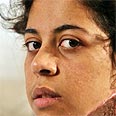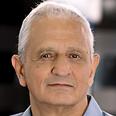Would-be suicide bomber Wafa al-Bas was apprehended
at Gaza’s Erez crossing Monday morning.
 The new laborers’ tunnel at Erez is very long and high. The terrorist is standing there, alone. Behind her are a fence and an endless tunnel. High above her is a loudspeaker. She does not see a human soul.
The new laborers’ tunnel at Erez is very long and high. The terrorist is standing there, alone. Behind her are a fence and an endless tunnel. High above her is a loudspeaker. She does not see a human soul.
Nahum Barnea is senior political analyst for newspaper 'Yedioth Ahronoth,' and Israel's leading political commentatorAuthorities only released a short clip of what the cameras at the site captured. The full film is hair-raising. The sensation is similar to watching a movie on a wild animal, a predator, being trapped.

At first, the sight of her is frightening. We know what her pants, filled with explosives, can do. Later, she realizes she has been hunted down. She becomes hysterical, desperate, searches for the activation switch that has flown to the wall, trying in vain, three times, to activate her explosive pants.
The image is that of a trapped animal.
She directs her gaze up high and talks to the loudspeaker. A voice in Arabic spews forth instructions. She obeys as if under a spell. And so it continues, one layer after another, until it became patently clear that she does not carry any more weapons or explosives on her body.
It was cruel, but proper.
There is no valor in a terrorist organization that recruits an unfortunate girl ravaged by burn wounds to a suicide mission. The real predator here is not this girl, but rather, those who sent her on this mission.
Many sleepless nights expected
That same night, Minister Haim Ramon met Palestinian Minister Mohammed Dahlan.
“For three weeks,” Dahlan said, “we’ve been asking you to detain Madmun, her operator. We spoke time and again with Rashid Abu-Shabak, your man, the head of the preventative security service in Gaza. Yet you’re not doing a thing.”
Madmun, a member of a small terror group called “Fatah abu-Rish,” is considered one of the most dangerous wanted terror suspects in Gaza.
Dahlan, a man of big gestures, festively flipped open his cell phone and called Rashid Abu-Shabak. “Abu-Khatem,” he asked, “why don’t you arrest Madmun?”
“We know he is at the Jabaliya refugee camp,” Abu-Shabak said. “The trouble is he’s constantly surrounded by people. We can’t reach him.”
“Abu-Shabak promised,” Dahlan said, “that he won’t sleep until he captures that man.”
“If that’s the case, then we can expect many sleepless months and years,” Ramon concluded sourly.
A day later, on Tuesday, Sharon met with Palestinian leader Abu-Mazen (Mahmoud Abbas.) The two leaders arrived at the meeting because they were largely forced to do so. U.S. Secretary of State Condoleezza Rice insisted, and they were afraid to disobey her.
However, instead of talking to each other, both figures spoke to their constituents.
This time it was Sharon’s show entirely. In the preparatory sessions between Saeb Erekat and Dov Weisglass it was agreed that film crews would be brought into the room at the beginning of the meeting. The Prime Minister’s Office would bring its own photographers, while the Palestinians bring their own, a stills photographer and a video cameramen. At the end, the Palestinians brought only a stills photographer.
Abu-Mazen assumed there will be no recording - this is the custom at such meetings. The participants are photographed modestly smiling to each other, with no sound.
However, Sharon wanted the nation to hear him preach to Abu-Mazen. He promptly admonished him in Hebrew, in a speech that was recorded and aired.
Sharon failed to minimize terrorism by even a smidgen with his speech, but the viewers were deeply impressed.

















